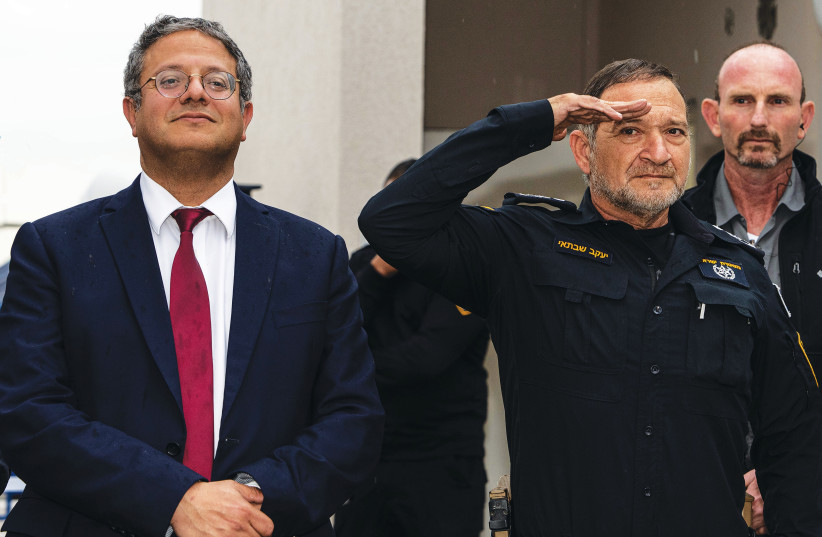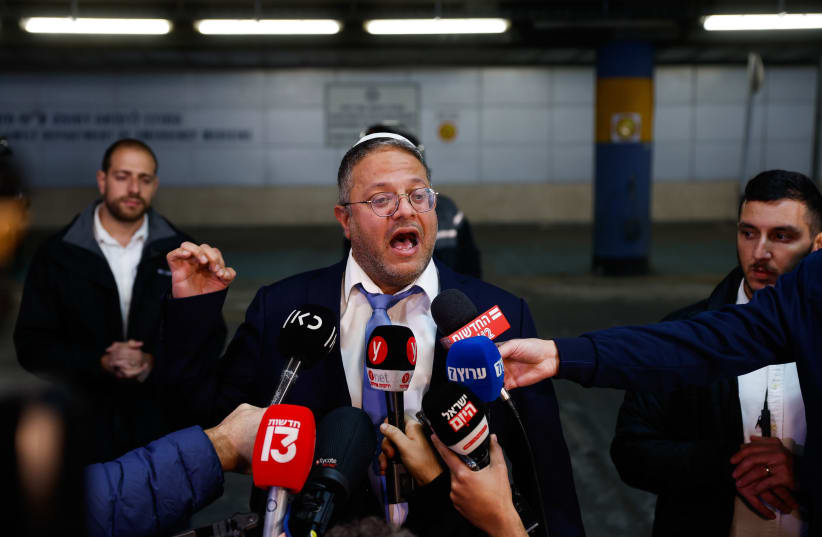There is certainly no shortage of areas in which law enforcement in Israel is lacking.
Whether it’s rampant domestic violence, which has resulted in nine women being murdered this year, soaring crime and violence in Arab communities, lawlessness in the Negev or the unrestrained carnage on the country’s roads, it’s clear that the police force is overwhelmed.
Is the establishment of a National Guard the answer?
The government seems to think so. On Sunday, the cabinet approved a proposal by National Security Minister Itamar Ben-Gvir to form a National Guard that will operate independently from the police in various emergency scenarios, fight terrorism and apply sovereignty “in areas where this is necessary.”
The move came to secure Ben-Gvir’s support for the temporary suspension of the government’s proposed judicial overhaul legislation and was the result of prolonged closed-door meetings between the national security minister and the prime minister last week.
Ben-Gvir, who ran his campaign on a promise to restore law and order, said in a statement after the decision on Sunday that “the National Guard that the government approved is an important message to the residents of Israel and to personal safety, a necessary, basic need for the State of Israel that enjoys broad consensus. The Guard will operate to return sovereignty and personal safety all over Israel.”
“The National Guard that the government approved is an important message to the residents of Israel and to personal safety, a necessary, basic need for the State of Israel that enjoys broad consensus. The Guard will operate to return sovereignty and personal safety all over Israel.”
Itamar Ben-Gvir

Although Ben-Gvir has requested direct control over the new body, such a decision has yet to be made, and if the National Guard isn’t under control of the police, it will require legislation.
The new policing body will join an already crowded field of agencies and institutions – from the IDF to the Shin Bet (Israel Security Agency) to the Border Police – tasked with protecting the country’s citizens and territory. Its establishment will cost roughly NIS 1 billion, necessitating an across-the-board budget cut of 1.5% from other ministries.
Wouldn’t it be wiser to funnel those substantial funds into the police to enable them to do their job better?
Israel Police Insp.-Gen. Kobi Shabtai, as would be expected, made that point in his criticism Sunday of the government decision, saying the new body would damage law enforcement and the ability of police to fulfill their responsibilities.
“Establishing an additional security body in the State of Israel, especially one whose areas of responsibility and activity overlap with those of the Israel Police, is a decision that has dramatic consequences for the internal security of the State of Israel,” he said.
“Establishing an additional security body in the State of Israel, especially one whose areas of responsibility and activity overlap with those of the Israel Police, is a decision that has dramatic consequences for the internal security of the State of Israel.”
Kobi Shabtai
The reasons for establishing an expanded National Guard were unclear, Shabtai said, adding that it was a waste of resources for an unproven model in which personnel will be engaged in the same activities as police. Overlapping duties would create power struggles, lack of responsibility and an unclear chain of command, he said.
Even if one believes that, in theory and despite the cost, the National Guard could be a useful tool to cope with the challenges noted above, the idea that Ben-Gvir should be in charge of it ought to be a non-starter.
In his first three months as a minister in charge of a highly sensitive portfolio, Ben-Gvir’s conduct has raised serious questions about his commitment to running his ministry responsibly.
Senior police officials have repeatedly been forced to shoot down Ben-Gvir’s rash directives, whether related to responses to terrorism or the protesters against the judicial reform. Having his own militia at his fingertips would remove the restraints and curbs that have largely kept his tendencies in check over the last three months.
National Unity MK Gadi Eisenkot, a former IDF chief of staff, said while the idea of a National Guard was correct, the formation of an operational body directly subordinate to the national security minister was a “serious event that destabilizes the principles of using force in the country and endangers the country.”
Former police chief Moshe Karadi went even further, warning that Ben-Gvir could use the National Guard to “launch a coup.”
The government’s decision to finance a National Guard has been made. The decision about who will be in charge of it has not. Giving Ben-Gvir authority over the National Guard would be a serious error in judgment.
